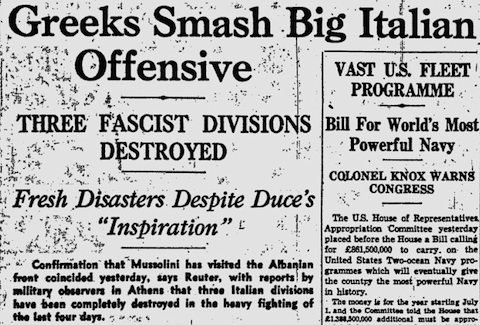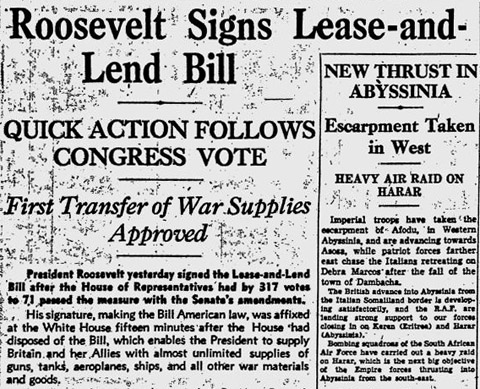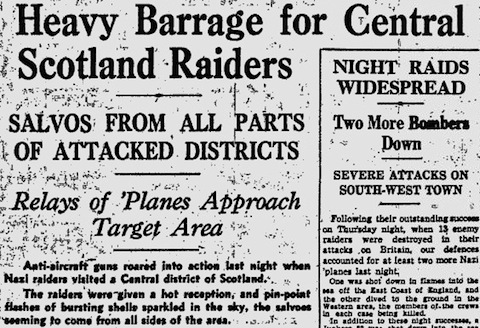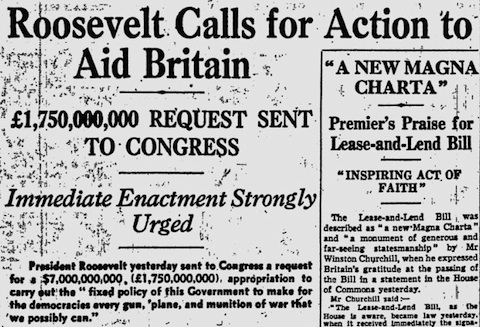
The big news today is that the latest Italian offensive against Greek forces in the Tepelini sector has been a disaster. War correspondents estimate 10,000 Italian casualties, including 2000 dead; yet ‘it was stated in authoritative circles in London yesterday that the Italians do not appear to have made any perceptible progress’ (5). This is despite (perhaps there’s a hint of because of) Mussolini’s presence at the front lines over the last few days, ‘leading or encouraging the Italian troops’. Greek spirits are understandably high. Looking at the bigger picture in the Mediterranean, the Herald‘s military correspondent suggests that the Germans
are not over-anxious to commit their forces to an attack on Greece while Russia is dissatisfied. Turkey threatens to become actively hostile, and Yugoslavia is, at least, very restless.
The reported presence of three German divisions (or elements thereof) in Tripoli is puzzling. It will certainly bolster Italian morale in Libya after recent defeats there.
It is not likely that an offensive against the Army of the Nile is planned. But it may well be necessary in German interests to safeguard a buffer between British troops and those of the French African Empire.
The bomber offensive against Germany continues. Big (for the Herald) headlines scream ‘NAZIS GIVEN HEAVIEST NIGHT OF BOMBS’:
R.A.F. bombers on Wednesday night carried out the heaviest raid yet launched on Germany, bombing Berlin, Hamburg, and Bremen.
While nine of the Luftwaffe raiders over Britain were being destroyed, the R.A.F. were attacking the enemy from Berlin to Boulogne. A Nazi destroyer was torpedoed by a Beaufort aircraft of the Coastal Command, the flash from the explosion being “as big as a house.”
An aerodrome in Southern Norway and shipping and docks at Ostend, Ymuiden, and Boulogne were bombed. Several of our new and powerful types of aircraft were in action over Germany. By the light of the moon many large fires were started near Berlin railway yards.
This was Berlin’s 37th raid, though its first since December.
The ‘nine raiders destroyed over Britain’ mentioned above made Wednesday the air defence’s most successful night of the whole war so far (the previous record being seven on 18 June 1940). Three were shot down by anti-aircraft guns, five by night fighters — including two Ju 88s by the new ‘Beau fighters‘ [sic], and two He 111s ‘by Defiants of the squadron which, at Dunkirk, destroyed 37 Nazi ‘planes in one day without loss to themselves‘. Mysteriously, ‘”other devices”‘ (the Herald puts this in quotation marks) are also credited with at least one kill. This is, it is claimed, the first time the Air Ministry has mentioned ‘other devices’:
What these “other devices” are the Luftwaffe may soon know to their cost. They represent another stage in the scientific research which is constantly going on in the hope of finding the solution to night bombing.
It’s all very hush-hush, but apparently senior RAF officers made ‘indirect reference’ to experimental work on these ‘other devices’ over the winter. So perhaps for those paying attention the ‘other devices’ are not such a surprise.
As for the air raids themselves, Merseyside was the main target on Wednesday night.
[It was] the longest raid by German bombers on England this year, but yesterday the city and neighbouring towns looked much as usual, and transport was normal.
A group of auxiliary firemen were killed by a bomb; and ‘policemen, fire-watchers, and wardens are missing’ after a bomb exploded in the roof of a school. If it weren’t for ‘one major incident in a working-class area’, casualties would have been considered light for such a heavy raid. As far as Scotland is concerned, no damage has been reported from Wednesday night or yesterday, although the German News Agency claims that the Luftwaffe ‘badly damaged’ an aluminium works at Fort William in Inverness-shire.
All of that is ‘straight’ war news, but much of the rest of the news is related to the war one way or another. An article on recent London fashion shows is subtitled ‘Fashion’s peace plans’ (6), as they were showing off ‘the kinds of floral and pastel cloths which will adorn women after the war is over’. The leading article today commends a deal being offered to Glasgow dockers of a ‘by no means ungenerous’ (4) minimum wage in return for ’11 turns of four hours each’ every week. This will ‘make Glasgow Harbour play an even more important part than hitherto in defeating HITLER’s U-boats’. The annual report of the Aberdeen Royal Mental Hospital claims that the war has had surprisingly little effect on the mental health of civilians: ‘it has increased their courage, morale, and faith, and it has lessened fear’ (3). And an ad on page 7 orders householders, retailers, millowners and farmers to ‘KILL THAT RAT!’ – ‘TRAP ‘EM, POISON ‘EM, GAS ‘EM, HUNT ‘EM’. Why? Because ‘IT’S DOING HITLER’S WORK’.
Let’s see how Reid is doing with those peace aims. Today he considers another possible model for collective security after the war: the British Empire. It is ‘not a federation […] not an economic union [but] is, however, a military union’ (4).
Britain and the Dominions form the one group of States whose union is firm enough to stand the full strain of war while each one of its members is free to follow its own policy in peace time.
(Reid has very deliberately referred to Dominions here, not colonies.) The strength of this union is based on loyalty between its members, and the knowledge that ‘in any real crisis they could count on support that would be instantaneous and automatic’:
the Dominions have known that if they ever had to face actual aggression the Navy and other Imperial Forces would come to their aid at once.
Reid’s conclusion is that there is no need for any ‘supra-national Government controlling political, economic, and social affairs […] The share of sovereignty to be given up need only be military’. As the basis for this ‘European Union’ he proposes ‘an International Air Force’:
An air force of overwhelming power in the hands of the Council of the Union would be, perhaps, the most formidable of all possible safeguards against aggression. The nucleus of such a force may seem to exist already in this island, where British, Polish, Czech, French, Dutch, and Belgian airmen act in conjunction with men from the Dominions, and there is no hint of friction or rivalry between them.
Hmmm. Seems to me I’ve heard this one before.
![]() This work is licensed under a Creative Commons Attribution-NonCommercial-NoDerivatives 4.0 International License.
Permissions beyond the scope of this license may be available at http://airminded.org/copyright/.
This work is licensed under a Creative Commons Attribution-NonCommercial-NoDerivatives 4.0 International License.
Permissions beyond the scope of this license may be available at http://airminded.org/copyright/.




Bomb them till they like us! It’s got to start working eventually.
No mention of Clydebank!
Pingback: Airminded · Saturday, 15 March 1941
Pingback: Airminded · Tuesday, 18 March 1941